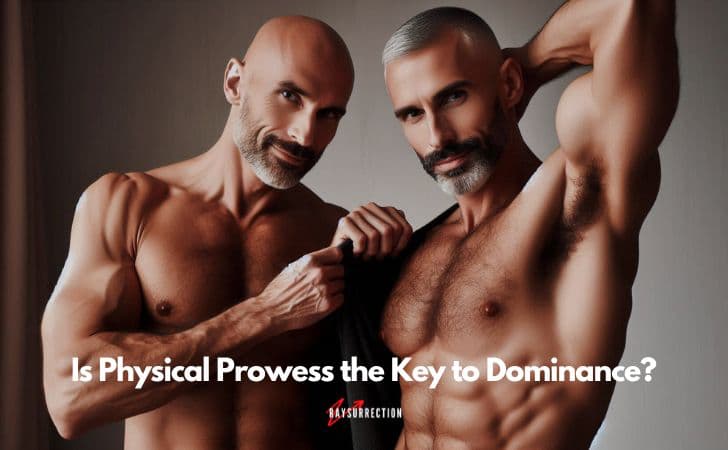People love to assume that being physically strong automatically puts someone in charge. It looks that way in movies, sports, and old-school survival scenarios. Reality is a little more complicated. Dominance doesn’t always belong to the strongest person in the room.
- Physical strength is impressive, but it doesn't guarantee control. A bodybuilder might struggle to negotiate a business deal against a sharp-witted investor. A chess grandmaster isn’t bench-pressing their way to a championship.
- Psychological intimidation often outshines pure physicality. A fighter with an ironclad mindset can break an opponent before the first punch lands. A quiet stare from the right guy can shake up a room more than a flexed bicep.
- Timing and strategy beat brute force almost every time. History is full of smaller armies defeating stronger ones through clever planning. A wiry martial artist can drop a massive opponent with perfect technique.
- Physical prowess alone rarely translates to long-term dominance. The toughest kid in school usually stops being so tough when adulthood kicks in. A genius with no muscle might run a company that employs former athletes.
So, what’s more intimidating to you—raw strength or sharp intellect? If you had to face an opponent, would you rather have brute force or a masterful strategy? Think about your answer—one path makes you a warrior, the other makes you a puppet master.
Beyond the Gym: Finding Physical Prowess in Everyday Life
Gym rats don’t have a monopoly on physical ability. Some of the strongest people aren’t lifting weights or running marathons. Physical prowess shows up in unexpected places. Strength, endurance, and skill develop in ways most people never think about.
- Parenting a toddler builds ridiculous endurance. Running after a small human who refuses to nap is a workout nobody trains for. Carrying a kid, a stroller, and three bags of groceries at once requires functional strength.
- Manual laborers often have next-level strength. A construction worker swinging a sledgehammer all day doesn’t need a fancy gym membership. A farmer tossing hay bales has a grip that could crush bones.
- Dancers have absurd body control. Ballet dancers move with power, precision, and balance that most gym-goers dream of. Breakdancers can hold themselves up in ways that defy physics.
- Martial artists train for strength in motion. A seasoned fighter develops flexibility, speed, and explosive power without chasing numbers on a bench press. Combat sports require a mix of technique, endurance, and resilience.
What’s something physical you do in daily life that most people don’t think about as training? Maybe you lift furniture for a living or run up subway stairs every morning. Recognizing your hidden strengths could change the way you see yourself.
Power, Influence, and Control
Muscles don’t automatically translate to control over others. The ability to influence people often comes from something less obvious. Strength plays a role, but other factors carry just as much weight. Control comes in many forms, and physicality is just one tool in the kit.
- Money beats muscles almost every time. A billionaire doesn’t need a strong punch when they have lawyers and private security. A CEO dictates the lives of thousands while sitting at a desk.
- Psychological influence controls more people than physical force. Charismatic leaders sway entire populations without throwing a single punch. Manipulative tactics keep people in line long after brute strength fades.
- Information shapes power more than physical ability. Knowing what someone fears or desires makes them easy to control. The ability to expose secrets wields more power than a knockout punch.
- Reputation can dominate without physical force. A man known for ruthlessness won’t have to lift a finger to keep others in check. Stories about someone’s past are sometimes scarier than their actual abilities.
If you had to build influence without using force, how would you do it? Would you use charm, intelligence, or sheer wealth? Your answer says a lot about how you move through the world.
Is Dominance Always Negative? The Psychology, Complexities
The word “dominance” sounds aggressive, but it doesn’t always mean something bad. People naturally sort themselves into hierarchies. Leadership and control take many forms, some more positive than others. The ways people exert dominance range from inspiring to downright terrifying.
- Leadership requires some level of dominance. A strong presence keeps people focused in high-pressure situations. Confidence alone can settle disputes before they escalate.
- Competence earns respect without aggression. A man who knows their craft inside and out becomes a natural authority. A master carpenter doesn’t need to bark orders to be followed.
- Abuse of dominance gets ugly fast. Dictators, bullies, and manipulative bosses thrive on taking control in harmful ways. Fear-based dominance rarely lasts without consequences.
- Dominance can be quiet and unspoken. A skilled professional might have control simply by being the best at what they do. The best players in a sport set the tone without a word.
How do you react when someone takes control of a situation? Do you step up, push back, or follow? Your response shapes the kind of leader—or follower—you become.
The Athlete’s Edge: How Physical Prowess Can Lead to Dominance (and its Ethical Implications)
Athletes exist in a world where physical ability shapes status. Strength, speed, and endurance become bargaining chips for influence. The connection between physical dominance and social standing has both perks and problems. Success in sports often stretches into other areas of life.
- Athletes command respect based on physical ability. Winning a championship puts someone in a spotlight others struggle to reach. Fame and fortune often follow elite performance.
- Physical dominance in sports leads to off-field influence. Top-tier athletes land endorsements, public speaking gigs, and even political power. A strong presence in sports translates to influence in business and media.
- Ethical problems arise when dominance turns unfair. Performance-enhancing drugs tip the scales in ways that cross moral lines. Privileged athletes sometimes exploit status for personal gain.
- Not all athletes maintain dominance after their peak. Retirement from sports can erase influence almost overnight. A former champion without a backup plan quickly becomes irrelevant.
Can You Buy Dominance? The Influence of Wealth and Status
Money flips the entire dominance conversation on its head. Strength, skill, and endurance matter, but wealth controls the game. People with resources shape the world around them in ways physical prowess never could. The connection between status and control is impossible to ignore.
- Wealth removes the need for physical dominance. A rich guy hires security instead of fighting their own battles. Lawsuits replace fists when conflicts arise.
- Status creates influence without effort. A last name, a degree, or a famous family opens doors strength never could. Being in the right circles matters more than personal ability.
- Access to elite training buys physical prowess. Expensive trainers, private facilities, and cutting-edge medicine give wealthy athletes an edge. Money speeds up success in ways talent alone cannot.
- Buying dominance has limits. Some people refuse to be controlled by money or status. A billionaire might still lose influence to someone with genuine skill and charisma.
Would you rather earn dominance through skill or just pay for access? If you had unlimited money, would you still work for respect, or just buy your way in? Your answer might reveal if you value earned success or just the perks that come with power.
Rethinking Masculinity: Beyond Physical Prowess and Dominance
Society has long tied masculinity to strength and control. The stereotype of the dominant, physically imposing man still lingers. Times change, and new ideas about masculinity reshape expectations. Being strong doesn’t mean what it used to.
- Emotional resilience holds more weight than brute force. A man who stays calm under pressure earns more respect than one who lashes out. Strength of character outlasts physical strength.
- Skills and intelligence redefine masculinity. Mastering a trade, solving complex problems, and creating art hold just as much value. A well-rounded man commands more respect than someone relying on muscle alone.
- Collaboration replaces outdated ideas of dominance. The ability to work with others outshines the need to control them. Leadership today looks different from the past.
- Strength still matters but in a different way. Physicality isn't useless, but it's just one piece of a bigger picture. A balanced approach to life outshines brute force in the long run.
ConclusionSo, is physical prowess the be-all and end-all of dominance? Not even close. Strength has its place, but influence, strategy, and even a well-timed smirk can tip the scales way more than a set of six-pack abs. If dominance is what you're after, you’ve got a lot of ways to get there.
The real question is—what kind of dominance do you want? Do you want to be feared, respected, or quietly in control from the shadows? However you answer, that choice shapes how you handle power in every part of life.




